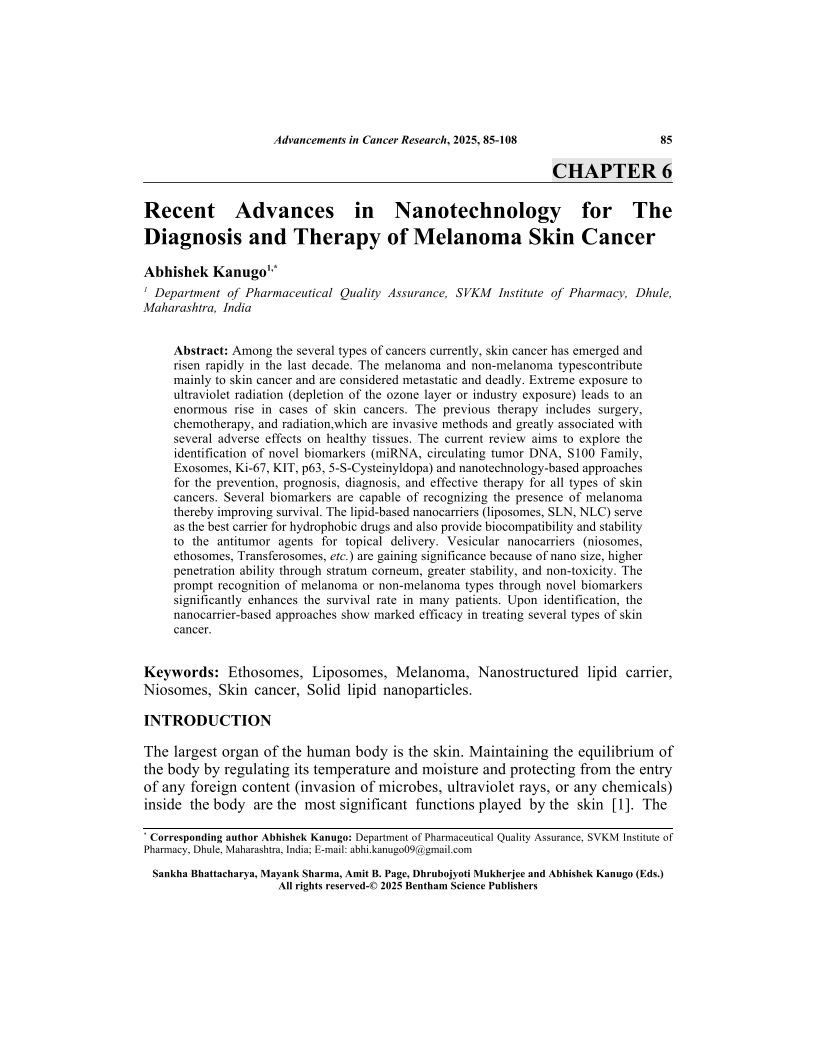Recent Advances in Nanotechnology for The Diagnosis and Therapy of Melanoma Skin Cancer

- By Abhishek Kanugo1
-
View Affiliations Hide Affiliations1 Department of Pharmaceutical Quality Assurance, SVKM Institute of Pharmacy, Dhule, Maharashtra, India
- Source: Advancements in Cancer Research: Exploring Diagnostics and Therapeutic Breakthroughs , pp 85-108
- Publication Date: February 2025
- Language: English
Recent Advances in Nanotechnology for The Diagnosis and Therapy of Melanoma Skin Cancer, Page 1 of 1
< Previous page | Next page > /docserver/preview/fulltext/9789815305906/chapter-6-1.gif
Among the several types of cancers currently, skin cancer has emerged and risen rapidly in the last decade. The melanoma and non-melanoma typescontribute mainly to skin cancer and are considered metastatic and deadly. Extreme exposure to ultraviolet radiation (depletion of the ozone layer or industry exposure) leads to an enormous rise in cases of skin cancers. The previous therapy includes surgery, chemotherapy, and radiation,which are invasive methods and greatly associated with several adverse effects on healthy tissues. The current review aims to explore the identification of novel biomarkers (miRNA, circulating tumor DNA, S100 Family, Exosomes, Ki-67, KIT, p63, 5-S-Cysteinyldopa) and nanotechnology-based approaches for the prevention, prognosis, diagnosis, and effective therapy for all types of skin cancers. Several biomarkers are capable of recognizing the presence of melanoma thereby improving survival. The lipid-based nanocarriers (liposomes, SLN, NLC) serve as the best carrier for hydrophobic drugs and also provide biocompatibility and stability to the antitumor agents for topical delivery. Vesicular nanocarriers (niosomes, ethosomes, Transferosomes, etc.) are gaining significance because of nano size, higher penetration ability through stratum corneum, greater stability, and non-toxicity. The prompt recognition of melanoma or non-melanoma types through novel biomarkers significantly enhances the survival rate in many patients. Upon identification, the nanocarrier-based approaches show marked efficacy in treating several types of skin cancer.
-
From This Site
/content/books/9789815305906.chapter-6dcterms_subject,pub_keyword-contentType:Journal -contentType:Figure -contentType:Table -contentType:SupplementaryData105

